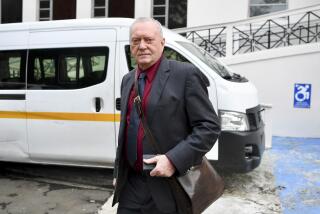Former Enron, Merrill Executives Found Guilty
HOUSTON — A jury convicted four former Merrill Lynch & Co. executives and a former mid-level Enron Corp. finance executive of conspiracy and fraud Wednesday in the first criminal trial to emerge from Enron’s 2001 collapse.
The six-week trial in U.S. District Court here stemmed from Enron’s 1999 sale to Merrill of a $7-million stake in three energy-generating barges.
Prosecutors said that the deal was a disguised loan because Enron promised to pay Merrill back and that the energy trader committed fraud when it booked the loan as a $12-million profit so it could meet earnings estimates.
“Jurors may have thought where there’s this much smoke, there must be fire,” said Kirby Behre, a former federal prosecutor who specializes in federal sentencing guidelines. “They may have thought that something was dirty here and no doubt about it.”
The barge deal isn’t among the numerous alleged financial machinations that pushed onetime Wall Street darling Enron into filing for bankruptcy protection in December 2001, as a web of accounting maneuvers to prop up its books unraveled.
But the verdicts in the case, the first chance prosecutors had to use evidence and strategies that may be used in later Enron prosecutions, are a vote of confidence in the government’s presentation of what it described as a microcosm of larger Enron frauds.
Among the forthcoming trials are the recently combined fraud prosecutions of former Enron Chief Executives Jeffrey K. Skilling and Kenneth L. Lay and former top accountant Richard A. Causey. The trial has not been scheduled.
Convicted Wednesday of one count of conspiracy and two counts of wire fraud were Dan Boyle, 48, a former Enron finance executive; James A. Brown, 52, former Merrill strategic financial group chief; Daniel Bayly, 57, former Merrill investment banking chief; William Fuhs, 36, a former Merrill vice president; and Robert S. Furst, 43, a former Merrill managing director.
Brown also was convicted of two counts of making false statements, and Boyle was convicted of one count of making a false statement.
The counts of conspiracy and wire fraud each carry a maximum sentence of five years in prison. The false-statement counts each carry a potential 10-year prison sentence. Fuhs, who also faced two counts of making false statements, had those counts severed and will be tried on them separately.
A sixth defendant, a former in-house Enron accountant, was acquitted. Sheila Kahanek, 38, testified that she opposed a verbal promise that the government contended made the deal a loan -- that Enron would resell or buy back Merrill’s interest within six months.
The jury was instructed to return today for the sentencing phase.
The barge case marked the first time Wall Street bankers were charged with active participation in a criminal Enron scheme. Witnesses said the defendants -- and others not charged -- agreed to participate as a favor in hopes of gaining more business from Enron.
Merrill avoided prosecution last year by acknowledging that some employees might have broken the law, cooperating with investigators and implementing reforms to prohibit dubious year-end deals. In March 2003, Merrill paid the Securities and Exchange Commission $80 million to settle civil allegations involving the barge deal, without admitting or denying wrongdoing.
Associated Press and Bloomberg News were used in compiling this report.
More to Read
Inside the business of entertainment
The Wide Shot brings you news, analysis and insights on everything from streaming wars to production — and what it all means for the future.
You may occasionally receive promotional content from the Los Angeles Times.









